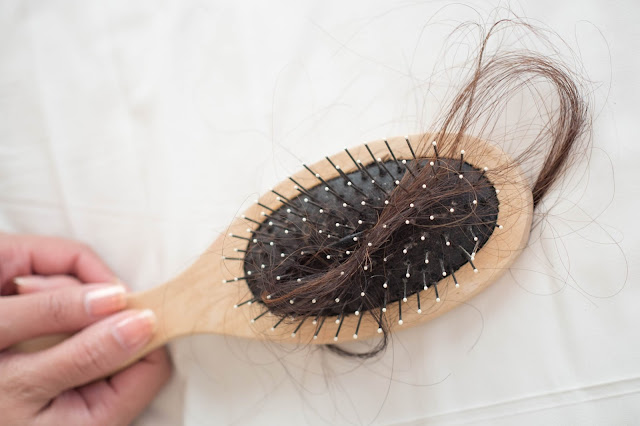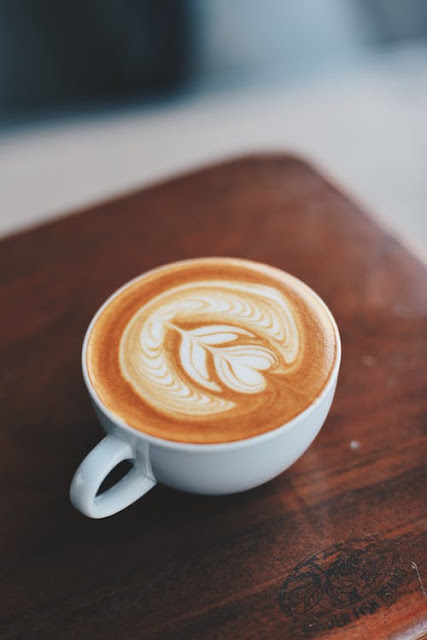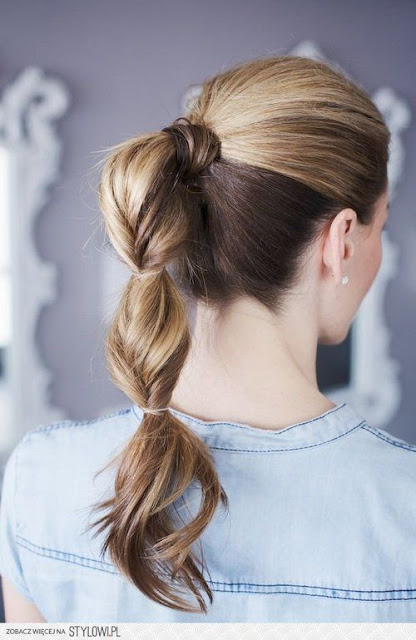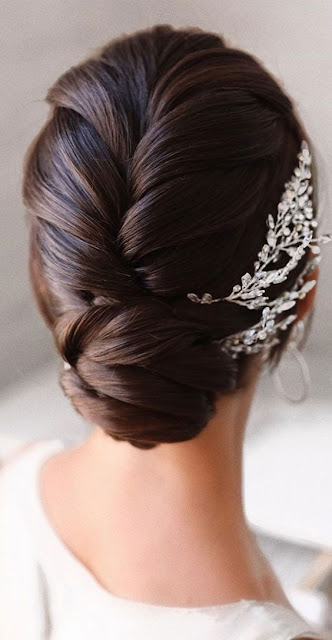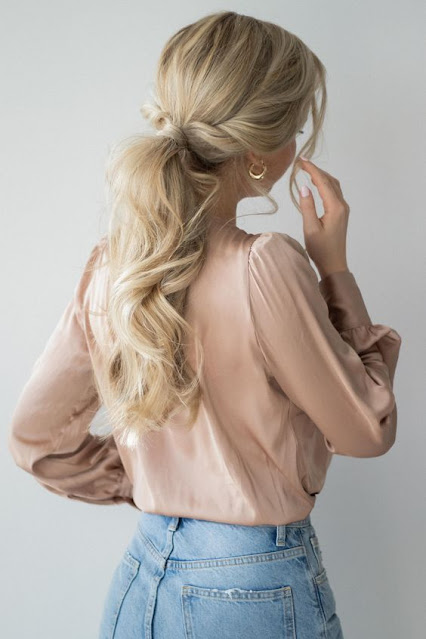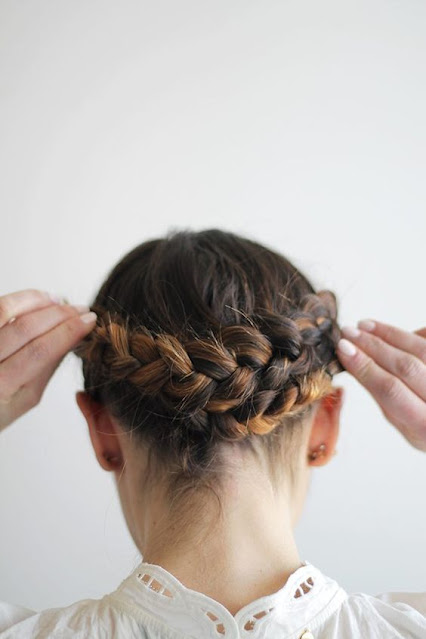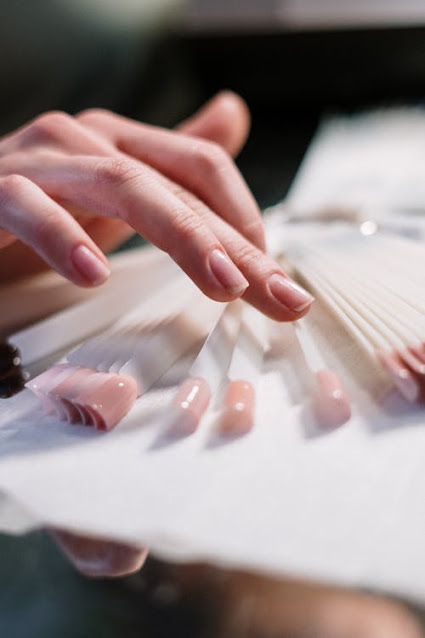Postpartum Hair Loss Relief Tips
You know the fast growing thick hair growth you had during your pregnancy? Enjoy it while you can as postpartum hair loss may occur in the months after giving birth. It is sad but true!
I remember after having my first baby when she was around 4 months old. My hair broke off around my forehead and I lost so much hair when I took a shower or just brushed my hair. I felt like I was going bald!
When does postpartum hair loss start?
It can be great for any woman. I began to experience hair loss about 4 months after my baby was born. Most women tend to experience postpartum hair loss between 2 and 4 months after having their child.
The extent of hair loss is different for every woman. For some women it is a lot of hair and for others not a lot. If you have long hair or had a lot of hair growth during your pregnancy, your hair loss can be more extreme.
But don't worry, not all hope is a loss! There are many ways to help with postpartum hair loss. That's exactly what I'll cover in this post!
How long does hair loss last after giving birth?
Now that we have dealt with how postpartum hair loss begins, the next obvious question is. "When does postpartum hair loss stop"?
Here is some good news for you. Postpartum hair loss is only temporary! Woohoo, I don't know about you, but this is music to my ears. Your normal hair growth pattern will usually return 6 months after giving birth. However, some women experience hair loss for up to a year after giving birth.
I will say this if you experience excessive hair loss even after a year. I would recommend calling your doctor.
How can you stop postpartum hair loss?
Can we have an honest moment together really quickly? I'm sorry to say, but there is nothing you can do to prevent hair loss after giving birth. I know! Do not be angry. Postpartum birth is normal and occurs due to hormonal changes your body goes through after having a baby.
So blame those beautiful woman hormones. Now, you can't completely stop hair loss after giving birth BUT you can take steps to minimize the effects of hair loss and promote healthy hair growth!
5 Postpartum Hair Loss Treatments & Remedies
1. Eat a healthy diet
It's a no-brainer that eating a healthy diet is very important to our overall health and wellbeing. For postpartum mothers in particular, eating a healthy diet can help your overall recovery and prevent postpartum hair loss from progressing.
Make sure you are eating a balanced diet of vitamins and nutrients. This is mainly found in fruits, vegetables, and whole grains. Don't forget to drink plenty of water throughout the day as well.
If you are having trouble keeping track of your water intake. Check out my free water intake tracker!
2. Reduce your stress levels
You can get a little giggle at this one. Don't worry i did it! Having a new baby brings all kinds of stresses with it. However, it will go a long way in finding ways to reduce your stress levels.
Studies show that stress can cause your hair to fall out. Here are some things you can do today to reduce your stress levels.
Try to get as much sleep as you can: when people tell you to sleep when your baby is asleep. Do it! There are many other times in a day and week that you can prepare these dishes and fold the laundry.
Practicing Self-Care: Creating a good and simple self-care routine will help you tremendously. After you've put your baby to bed and before you go to bed, take 15 minutes to jump in a bubble bath or meditate. Self-care is very important and it is easier to get used to when your child is young. If you need ideas on how to self-care, check out this post.
Take a break: being a mom is tough. You might be running around trying to clean the house, feed your baby, change a million diapers a day, prepare dinner, and the list goes on and on. Take a few minutes to relax. Kick your feet and watch one of your favorite Netflix episodes or read for 20 minutes. No matter what it is, give yourself a break.
3. DIY hair masks
Don't be surprised by the "hair growth" products out there. Now there may be some great natural products out there that you can use, but often hair restorers are full of chemicals. Which can lead to hormonal imbalance, skin diseases and many other things that do more harm than good to you.
Learn more about which products are good and which are bad. Find out more about natural beauty products here.
Here are some natural hair loss treatments you can do:
Avocado Hair Mask: If avocados are super healthy to eat, they have to be good for your hair too .right ?! They're packed full of vitamins, fatty acids, and proteins, all of which are good for your hair and scalp! You can find lots of avocado hair mask ideas on Pinterest.
Castor Oil: This is another oil that is high in fatty acids and is great for treating hair loss.
Egg Hair Mask: The first time I tried an egg hair mask, I'll say I was completely spoiled! but it did wonders for my hair! Egg hair masks can help with hair growth and repair damaged hair.
4. Baby Beard Club - Miracle Bro Hair Growth Serum
This is one of my favorite natural hair regrowth serums. It's from Baby Beard Club and I've been using it since I had my second baby and although I've still lost some hair. I haven't lost nearly as much as I did after my daughter. And the best part is, I didn't get my hair broken on my forehead!
The Miracle Bro oils smell amazing and are very therapeutic. You can use the oil on your scalp, eyebrows and eyelashes. It's also a great hair regrowth serum for men. If you and your husband are both in need of great hair restorer, Miracle Bro is a win-win for both of you.
The only downside is that if you already have oily hair like me, Miracle Bro will make your hair a lot oily. I will apply the serum just before bed and then wash my hair in the morning and my hair will be perfect for the rest of the day. When you use your eyelashes, it is liquid. It is therefore essential to use an eyebrow brush and only apply the serum to the tips of the eyelashes.
5. Avoid using products for hard hair
You may want to find new ways to style your hair for a while if you experience hair loss after giving birth. Because harsh products can make your hair loss more extreme.
Here is a list of things to avoid:
Heated Tools: This is a tough question for me and I would say it is a heavy sacrifice for most women. But hair dryers, curling irons, and flat irons can do even more damage to your struggling postpartum hair. Not to mention, it can damage the new hair that is trying to grow back!
Limit how often you wash your hair: I usually try to go every other day when washing my hair. This way my hair gets a break from being always shampooed. I would also recommend using an all-natural shampoo during this time.
Don't do tight hairstyles: when I start losing hair, I wear my hair LOT! This way, it can hide my breaking and falling hair. Instead of using regular hair ties, I'm going to switch to hair ties that I know are right in the 80s! I also learned to love my natural hair. The less I play around with my hair, the better!
Use a large wide tooth comb: Using a wide tooth comb will prevent your hair from breaking as badly when you comb it.
NOTE: PLEASE Use the Older Post and Newer Post buttons just below comment box to navigate between posts.
